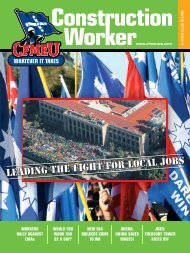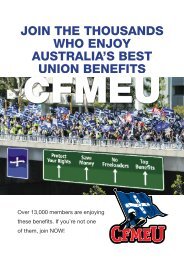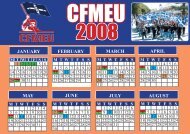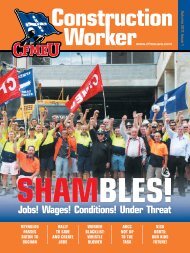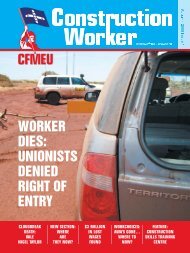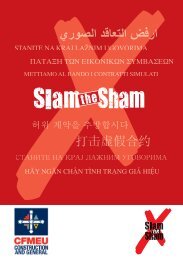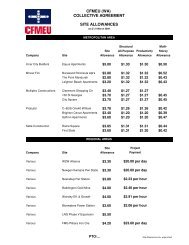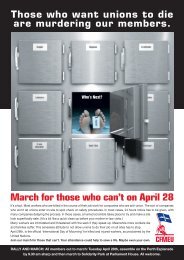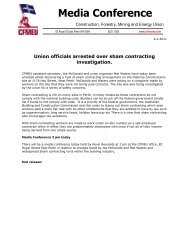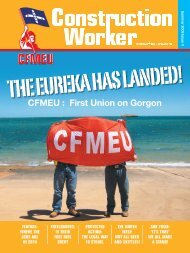Summer Issue 2012 - cfmeu
Summer Issue 2012 - cfmeu
Summer Issue 2012 - cfmeu
You also want an ePaper? Increase the reach of your titles
YUMPU automatically turns print PDFs into web optimized ePapers that Google loves.
I N T E R N AT I O N A L N E W S<br />
with Vinnie Molina<br />
In the hands of the multinationals<br />
Since the 1st January 1994, when<br />
the first Free Trade agreement was<br />
signed between the US, Canada<br />
and Mexico, transnational<br />
corporations have sought maximum<br />
profits. Back then many of these<br />
multinational companies closed<br />
their plants at home and shifted<br />
across the border to Mexico where<br />
labour laws were weaker,<br />
environmental laws did not exist and<br />
labour was cheaper. Estimates have<br />
been given that US jobs lost to<br />
NAFTA range from 700,000 to nine<br />
million.<br />
These same corporations,<br />
particularly in the resource sector,<br />
moved into several other countries<br />
in Latin American and the Asia<br />
Pacific. More recently they have set<br />
up economic Free Zones in<br />
countries like India and other<br />
developing countries where the<br />
main feature is no union rights and<br />
lower standards of wages and<br />
conditions.<br />
In Australia we see how these<br />
corporations have drafted labour<br />
laws that cross several countries<br />
and continents. They realise they no<br />
longer need to move the plant and<br />
factories because it was possible to<br />
move workers across borders.<br />
Again, the main feature of these<br />
labour laws in Australia and<br />
elsewhere, is the violation of trade<br />
union rights and lowering of wages<br />
and conditions.<br />
Migration laws have been<br />
introduced to allow free mobility of<br />
labour to compete with local<br />
workers. Here at home we have<br />
seen the proliferation of temporary<br />
workers on s456 & s457 visas.<br />
These workers arrived in Australia<br />
with false promises of a bright future<br />
but in reality are used as modern<br />
slaves with little or no rights.<br />
These workers, often from non<br />
English speaking backgrounds,<br />
work on lower rates and many of<br />
them would suffer deportation if<br />
they speak out or join trade unions.<br />
During downturns in the economy<br />
these workers lose their jobs and<br />
are sent home, often without<br />
entitlements. In a few cases<br />
companies sacked local workers<br />
ahead of visa and temporary<br />
workers. Feedback suggests they<br />
remained and in many cases<br />
replaced local workers.<br />
At the peak of the mining boom,<br />
multinationals and politicians used<br />
the media to create a fictitious<br />
shortage of skilled labour.<br />
The government responded by<br />
introducing the Enterprise Migration<br />
Agreement. EMAs which list WA as<br />
a regional economic zone and<br />
allows for the importation of some<br />
2000 workers for what can be<br />
considered a pilot for this model, the<br />
Roy Hill Project. In other areas such<br />
as the Mid West in WA, complaints<br />
have been received that local<br />
workers are being made redundant<br />
and replaced by cheap labour from<br />
overseas.<br />
The objective of the multinational<br />
corporations is to divide the working<br />
class by creating unemployment<br />
and fictitious shortages of skilled<br />
labour to justify the mobility of<br />
workers, often from poor countries -<br />
to pit worker against worker and<br />
break solidarity.<br />
This sees workers from Bangladesh<br />
travelling to India and Dubai;<br />
Filipinos all over the world; Chinese<br />
workers into Singapore, Australia<br />
and Europe; Irish and Greek workers<br />
to Australia, Canada, the US and<br />
other parts of Europe.<br />
Many of these workers travel abroad<br />
and are engaged by people<br />
smugglers, so it becomes a<br />
lucrative business in itself. Our<br />
experience is that only a minority of<br />
these workers joins trade unions to<br />
represent their industrial interests.<br />
The others are treated poorly and<br />
are disposable.<br />
A new trade agreement (TPPA) is<br />
currently being negotiated between<br />
the US, Australia, Brunei, Chile,<br />
Malaysia, New Zealand, Peru,<br />
Singapore, and Vietnam.<br />
US corporations are pushing for<br />
unrestricted access to Australian<br />
government contracts and oppose<br />
purchasing policies that protect<br />
local jobs and workers rights.<br />
US corporations have also made<br />
public submissions opposing<br />
commitments to workers rights<br />
being in the agreement. The ALP is<br />
currently pushing for labour rights<br />
agreed by the UN International<br />
Labour Organisation to be included.<br />
The next TPPA negotiations happen<br />
in Auckland, 3rd to 12 December,<br />
with NZ workers planning a national<br />
day of action on the 8th.<br />
Construction Worker – <strong>Summer</strong> <strong>2012</strong> Page 59<br />
CFMEU



